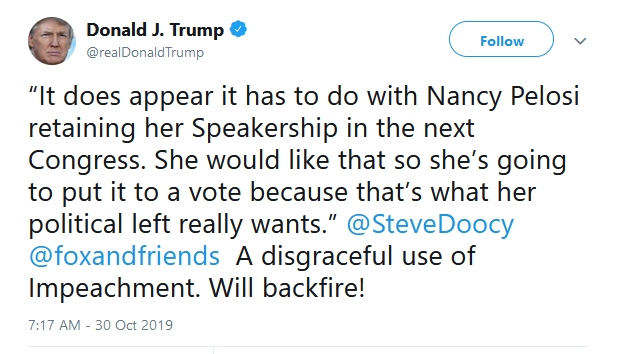All the tactics T’s lawyers use to keep T away from revealing anything about his actions, what was communicated and basically “What the President knew and when did he know it.” The upshot is to protect an incumbent president…but the truth is T can and should be INVESTIGATED…within the constructs of the law, and Impeachment process demands this.
As Pelosi keeps stating “No one is above the law.”
One lawyer for the president recently even suggested that Mr. Trump could shoot someone on Manhattan’s Fifth Avenue and not be investigated by local authorities, echoing a statement the president made during his 2016 campaign in which he said he wouldn’t lose any voters over such an action.
A longstanding Justice Department legal opinion says a president can’t be federally prosecuted while in office, but says nothing about being investigated, and in any case doesn’t apply to state and local efforts to enforce their own laws. Mr. Trump’s lawyers say he is beyond any such actions.
“This administration has articulated a view of presidential power in which the president is above the law,” said Erica Newland, who served in the Justice Department Office of Legal Counsel during both the Obama and Trump administrations.
Lawyers representing the president either in his personal or institutional capacity have argued that law enforcement can’t investigate the president at all; that he can shut down investigations into himself or his associates; and that obstruction-of-justice laws don’t apply to the president. (Nobody argues that presidents aren’t subject to all laws once they are out of office.)
At the same time, since Democrats took over Congress in January, Mr. Trump’s government and personal lawyers have fought numerous legal battles over congressional oversight—arguing that close aides don’t have to testify even if subpoenaed, that all congressional investigations must serve a “legislative purpose,” that cabinet secretaries can disobey subpoenas and that a congressional impeachment inquiry is invalid.
Further, they have argued that federal courts can’t transmit evidence of presidential wrongdoing obtained by a grand jury to Congress for possible consideration of impeachment.n some instances, Trump administration attorneys have contended that courts have no right to stop the president from taking official actions.
Some of the claims are contradictory: Mr. Trump’s personal attorneys have argued he can be held accountable only by Congress, while his White House lawyers fought efforts to hold him accountable in Congress.
…
To some extent, Mr. Trump’s lawyers are just doing their job: taking aggressive, legal positions in the best interests of the client, and hoping for the best. Lawyers for previous presidents have made similarly aggressive claims about powers and immunities to defend the president personally or the long-term authority of the office.
But scholars of presidential power say what is different about the Trump administration is its unwillingness to acknowledge the legitimacy and interests of other institutions.
Sidebar - T’s lawyer’s arguments recap
Presidential Power
Some positions that lawyers representing Mr. Trump, the White House or the Department of Justice have argued since January 2017 in court or in other legal documents:



 We found the answer. Y’all are amazing! So proud of this crew!
We found the answer. Y’all are amazing! So proud of this crew!
